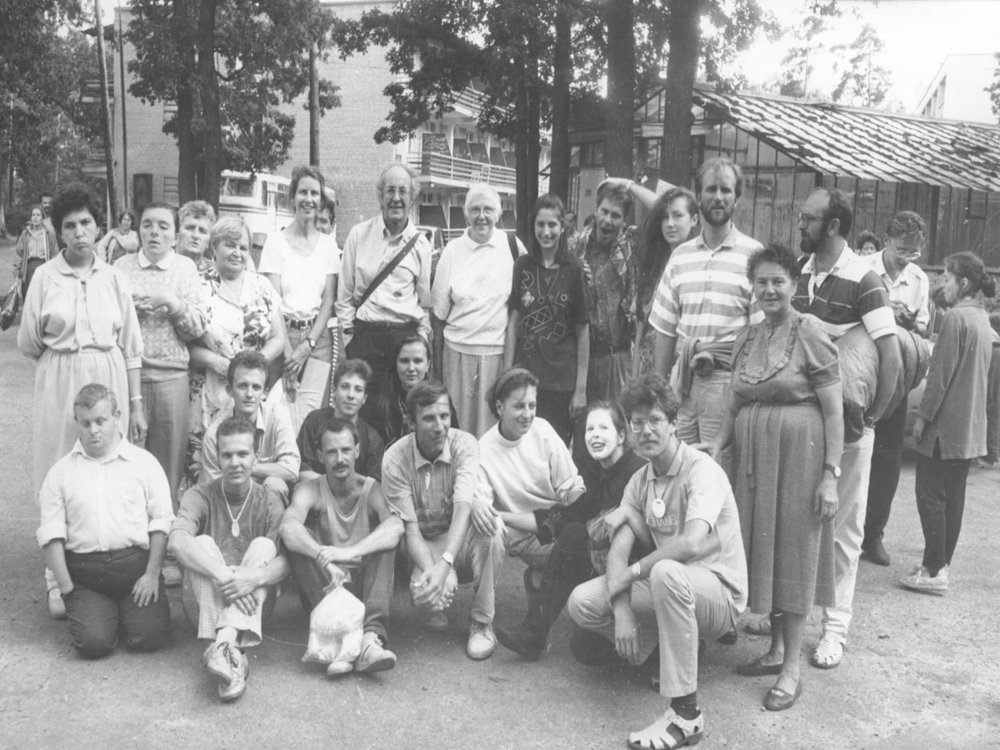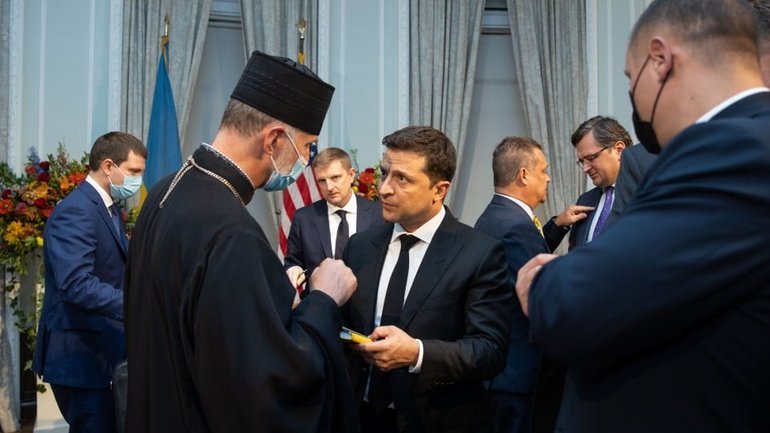Making a Difference: Henri Nouwen in Ukraine
As the war in Ukraine enters its tenth horrific week, I have been thinking, as I often do, what would Henri say? What would Henri do? He would certainly be saying and doing something. In 1965, when Martin Luther King Jr. was marching from Selma to Montgomery, Henri drove all night from Topeka, Kansas to be with the marchers. He spoke passionately at rallies against the Vietnam War and led protests against nuclear arms. In 1983, he undertook an exhausting ten city tour of the United States denouncing American involvement in Nicaragua. During the Gulf War, he joined the protestors in Washington, DC.
Henri Nouwen had a personal connection to Ukraine, which he visited twice, once in 1993 and again in 1994. The visits were short - just ten days each - but powerful, both for himself and for those he encountered.
His visits were at the invitation of his friends Zenia Kushpeta and Borys Gudziak.
Zenia Kushpeta had moved to Ukraine shortly after the dissolution of the Soviet Union in 1991. She dreamt of starting a L’Arche community in the newly independent country. She helped organize the first communities of “Faith and Light” in various Lviv parishes. These were intended to bring people with disabilities and their families together in fellowship. Henri knew Kushpeta from her days as an Assistant at L’Arche Daybreak, his home community in Toronto.
Borys Gudziak was a former student from his Harvard years. He was the American-born child of Ukrainians who had immigrated to America in the 1950s. In 1983, the year they met, Gudziak had just returned to the United States after attending seminary in Rome, studying with Cardinal Josyf Slipyj of the Ukrainian Greek Catholic Church. In 1992, he moved to Lviv with a dream to be part of a movement to revitalize the Ukrainian church from its years hidden in the ‘catacombs’.[1]
Henri had a dream of his own. Like his spiritual mentor Thomas Merton, Henri dreamt of the union of the Christian East and West. As early as the 1970s, Henri lectured on the wisdom of the Desert Mothers and Fathers. His book The Way of the Heart: Desert Spirituality and Contemporary Ministry (1981) aimed to share his ideas more widely. One semester he taught a course on hesychasm – a mystical tradition of contemplative prayer in the Eastern Orthodox Church.
He was also drawn to 19th century Russian mystics, and was familiar with the Philokalia, an anthology on prayer in the Orthodox tradition. Excerpts from Igumen Chariton’s book, The Art of Prayer: An Orthodox Anthology (1966), were often in his course handouts. It is from the Christian East that Henri learned the Jesus Prayer, which formed the foundation of his own spiritual practice. His prayer life was also nourished by iconography. His book Behold the Beauty of the Lord: Praying with Icons (1987) conveys his ability to enter into the Eastern Christian mind and heart.
With Zenia, he ministered to families of Faith and Light, and with Borys he gave retreats for youth groups. He also kept a personal journal. In an early entry he records:
“We keep wondering whether the future will be any different. With so many voices in Russia wanting to reclaim Ukraine as part of their territory, there is constant fear that independence might be a very fragile thing. The fact that the U.S. pays so much attention to Russia and so little to Ukraine, except in pressuring it to give up its nuclear arsenal, makes Ukrainians question how much international support their independence will get when push comes to shove. The somber faces of the peasants certainly are not full of expectation for a better future.”
During his second visit in 1994, he uses his journal to record the deep sadness of the Ukrainian people and commits to listen to them. Nathan Ball, a close friend who accompanied Henri on both trips, recalls that Henri once asked the assembled crowd if they had any questions. A young man raised his hand and spoke. Henri sat silently with the young man’s question. “It was much longer than comfortable,” Nathan recalls.
Perhaps he saw that his homilies of hope and joy, so resonant in prosperous America, were out of step with the lived reality of the Ukrainian people. He needed to listen in the silence of his heart before responding.
He also needed to bear witness. He observed the mothers of children with disabilities:
“It became clear to me how isolated most of these mothers felt. Many of them had no spouse and very little help on a day-to-day basis. Faith and Light offered moral and emotional support, but many basic necessities were still lacking. I realized that I should not be too fast in calling people to joy, peace and gratitude. Important as that is, many parents need a space to express their accumulated feelings of frustration, disappointment, anger, resentment and deep physical and emotional fatigue. They need to be heard with a heart that wants to understand, and with a mind that looks for ways to make their lives a little easier. Sometimes a new wheelchair, a typewriter, a new ramp, a regular visitor, etc. can make all the difference.”
A typewriter? How did that make it onto Henri’s list? The story goes that shortly after Henri’s death, his brother Laurent got a call from a Ukrainian man claiming that Henri had promised him a typewriter. Could he still hope to get it? Laurent followed through with his brother’s promise.
The delivery of the typewriter was the first of what would become a convoy of goods that Laurent Nouwen would deliver to Ukraine. For the next two decades, he would pack delivery trucks with all kinds of donated goods: computers and school desks, washing machines and beds for psychiatric hospitals, and more. Gudziak, who befriended Laurent after Henri’s death affectionately calls him the “Practical Apostle”.
While Henri was alive, his Ukrainian journals were published in the New Oxford Review, but he also hoped to publish a book on his experiences for a North American audience. Laurent updated the vision and partnered with translator Maryana Karapinka and Lviv publishing house, Svichado, to publish the journals specifically for Ukrainians. They were released in December 2021, the 25th anniversary year of Henri’s death.
At the book launch translator Karapinka shared her experience of seeing Lviv through Nouwen’s eyes saying, “I was struck by the fact that Father Henri looked at our post-Soviet reality with the eyes of love. He doesn’t understand everything, he is sometimes annoyed, but he tries to comprehend the situation to its core, he is not afraid to meet suffering people.” [2]
A few days later, on December 23, 2021, Borys Gudziak, now Archbishop-Metropolitan for Ukrainian Catholic Archeparchy of Philadelphia, had the opportunity to present a copy of the book to Ukrainian President Volodymyr Zelensky who was on a visit to the United States.
(source: Religious Information Service of Ukraine)
Putin’s invasion of Ukraine was months away, but perhaps that night Zelensky read with shivers an observation from Nouwen that speaks across time and beyond death. The journal entry was written a day after Nouwen’s second trip to Ukraine from Poland enroute back Canada.
“Being in Poland made me aware that Ukraine is like the foster child of Europe, not highly respected, not well supported, not given the attention it needs. I suddenly remembered that in the story of the last judgment, God judges not individuals, but nations. The question: "What have you done to the least of mine?" does not simply refer to individual poor people but also, and maybe first of all, to poor nations. God loves the poor, God even has a preferential love for the poor. Ukraine is poor, very poor, not just materially, but also emotionally and spiritually. To care for the poor means much more than to reach out to people who need food, jobs, clothes and a safe place to stay. It means also to care for nations that are crushed by the forces of history and live under the burden of being ignored and rejected by the international community.”
How would Henri have responded in world now so brutalized by hatred? He would have responded with friendship, with showing up, by listening deeply and standing with people in their pain, by helping with practical needs. Like Laurent, Zenia and Borys he would dare to make a difference.
[1] The Ukrainian Greek Catholic Church was illegal from 1946-1989. It was the biggest illegal church in the world and was known informally as ‘the church of the catacombs’.
[2] Quoted in “Ukrainian Journals of Henri Nouwen presented to Philadelphia audience, December 22, 2021, Archeparchy of Philadelphia website (https://ukrarcheparchy.us/archeparchy-news/knigu-ukrainski-shhodenniki-otcja-genri-nouena-predstavili-v-filadelfii)








